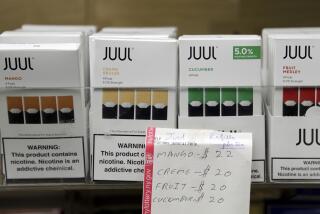FCC announces payola settlement
- Share via
WASHINGTON — Federal regulators Friday announced an unprecedented settlement with four radio broadcast companies on charges of accepting cash and merchandise from record companies in exchange for airplay.
The four broadcasters will pay a combined $12.5-million fine and agree that their 1,653 stations will not engage in payola practices, according to a consent decree with the Federal Communications Commission.
The radio companies involved -- Clear Channel Communications Inc., CBS Radio Inc., Entercom Communications Corp. and Citadel Broadcasting Corp. -- represent four of the nation’s six largest radio station owners. They admit to no wrongdoing under the three-year settlement.
A separate agreement was negotiated by the American Assn. of Independent Music and the radio groups. In that deal, the broadcasters agreed to provide 8,400 half-hour segments of free airtime for independent record labels and local artists over the next three years.
The free airtime, between 6 a.m. and midnight, would be granted to companies not owned or controlled by the nation’s four dominant music labels: Sony BMG Music Entertainment, Warner Music Group, Universal Music Group and EMI Group. CBS will provide 800 hours, Citadel 1,300, Clear Channel 1,600 and Entercom 500.
“Payola hurts musicians, the radio industry and the free flow of creative talent because music is chosen on the basis of who can pay the most -- not who sounds the best,” said FCC Commissioner Jonathan S. Adelstein, who has been largely credited with pushing the two-year investigation.
“While this settlement is not a panacea to all payola woes, it requires the implementation of certain meaningful reform measures that should change corporate practices and behavior,” Adelstein said.
But Paul Porter, co-founder of media watchdog group Industry Ears, says the agreement does not go nearly far enough.
“You’re basically talking about a fine, and a fine doesn’t stop payola,” Porter said, adding that the broadcasters did not have to admit guilt and that he expected radio playlists to remain virtually unchanged.
CBS Radio and Entercom issued separate statements saying they were pleased to settle with the FCC and would continue to comply with sponsorship identification rules. CBS said many of the business practices detailed in the consent decree mirror those adopted as part of the company’s previous settlement with former New York Atty. Gen. Eliot Spitzer, who is now the state’s governor.
Representatives from Clear Channel and Citadel did not return calls for comment.
Peter Gordon, founder of Thirsty Ear Recordings in Norwalk, Conn., led the separate negotiations on behalf of the independents and said the “real time commitment” from broadcasters would give local artists a chance to get some airplay at hours normally dominated by songs from major labels.
“We want to create the cycle and then grow it,” Gordon said. “This is the beginning, not the end. It’s a tangible plan to get traction in the market.”
But Porter said that deal was too broad and unenforceable. “There’s no checks and balances,” he said.
Gordon acknowledged that the broadcasters’ participation was voluntary and said there was no set date by which they must provide airtime for independent or local artists.
The consent decree is the second-largest penalty ever assessed by the FCC, trailing only a $24-million settlement reached with Univision Communications Inc. regarding children’s television obligations.
Breaking down the fine, Entercom will pay $4 million, Clear Channel owes $3.5 million, Citadel was fined $2 million and CBS will pay $3 million.
More to Read
The biggest entertainment stories
Get our big stories about Hollywood, film, television, music, arts, culture and more right in your inbox as soon as they publish.
You may occasionally receive promotional content from the Los Angeles Times.










